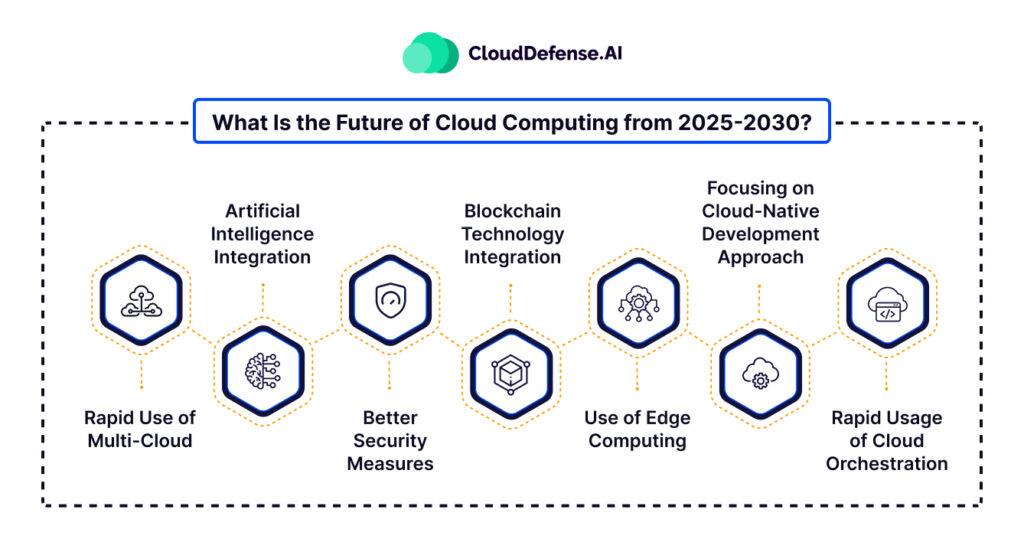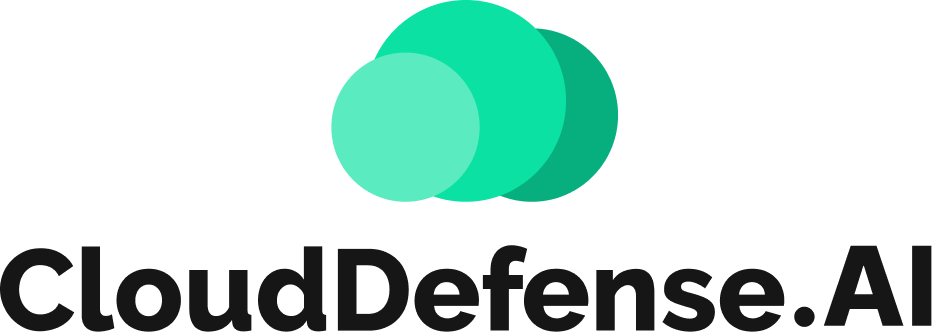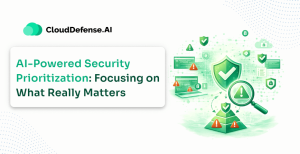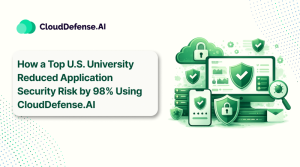Almost every modern organization is shifting to digital infrastructure and opting for a cloud workspace due to its fast workflow, better business management, and impressive return.
Cloud computing serves as the key driver behind the digital transformation in today’s businesses and helps businesses to operate with better scalability, operation, and collaboration.
With the increase in digitization in business operations and heavy reliance on data analysis, are you speculating what the future holds?
In this blog, we will discuss the future of cloud computing from 2025 to 2030. We will cover key factors affecting the future of cloud computing and how they will reshape how we operate on the cloud, including:
- A brief overview of cloud computing
- The benefits of Cloud Computing
- 10 future trends and predictions of cloud computing
- What is the future of cloud computing from 2025-2030?
- What are the top cloud computing skills?
- Cloud Computing Using Artificial Intelligence
Let’s dive right in!
Cloud Computing
Cloud computing is a modern technology that enables the delivery and access of computing services like networks, applications, databases, servers, analytics and intelligence, and storage over the internet. It allows different devices and applications to communicate over the internet and enhances the efficiency of data and storage management.

Businesses leveraging cloud computing technology can run their business processes and services smoothly without having to rely on physical infrastructure. It allows businesses to offer services and applications to users residing anywhere through the internet.
Cloud computing has three main elements that include cloud-based software, cloud-based infrastructure, and cloud-based platforms:
1. Cloud-Based Software: Cloud-based software is those applications or programs that are offered over the internet by the SaaS provider. With this kind of software, the user won’t have to think about infrastructure or maintenance. They can access the software and its features using a web browser through the internet.
2. Cloud-Based Infrastructure: Cloud-based infrastructure serves as the backbone of modern cloud IT services. It refers to the virtual networking feature, computing services, and data storage space offered by third-party service providers.
Cloud-based infrastructure offers users the convenience to run applications or store data with optimum flexibility and better control over the resources.
3. Cloud-Based Platform: Cloud-based platforms are known as Platforms as a Services where the user is given a read-to-use platform for deploying and managing an application. It not only enhances efficiency but also prevents users from worrying about maintenance, patching, and capacity management.
It enables developers to focus on codes and developing the application.
Benefits of Cloud Computing
Cloud computing has revolutionized the way organizations operate in the industry. It has not only eased up their business operation but also helped them overcome many traditional hurdles. The primary reason behind the massive boom of cloud computing in today’s business environment is mainly because organizations don’t have to make major investments while managing their business operations online.
From cloud storage, hosting, and backup service to SaaS, cloud computing is helping organizations with numerous services. Organizations nowadays rely more on cloud services as opposed to traditional on-premises services, as they allow on-demand access to shared platforms and resources.
Unlike conventional systems, cloud computing is highly reliable and offers excellent disaster recovery management. It also allows organizations to maintain complex hardware in their cloud environment while maintaining a smooth flow of their operation.
Here are some of the crucial benefits of cloud computing:
Simplified IT Infrastructure Management
The arrival of cloud computing has made it easy for every business to manage its IT infrastructure.
Cloud computing simplifies everything. Employees won’t have to worry about security patching, hardware maintenance, and application updates. Building cloud-based applications is also simplified as employees can rely on superior resources along with connected network equipment.
Scalability
Scalability is one of the biggest factors that has led many businesses to migrate their IT infrastructure to the cloud.
Organizations can grow their business gradually without investing much to expand their infrastructure to accommodate their increased load on applications or services. It allows developers to expand their services or application features without worrying about infrastructure size.
Highly Cost Effective
Cloud computing has saved businesses a lot of capital as there is no upfront capital investment for hardware and other resources.
Cloud services provide users with an efficient subscription model where they only have to pay for the required resources. They need to pay anything for physical computing, networking, and storage, and this has helped them curb operational and upgrade costs.
Extremely Flexible
The flexibility that cloud computing offers is one of the primary reasons behind its widespread adoption. Cloud computing enables organizations, employees, and users to access applications, services, and data from anywhere in the world via the Internet. It has made remote working simpler and has allowed more employees to work from home.
Disaster Recovery
Cloud computing has helped organizations with impressive disaster recovery management, assisting organizations back up their essential data through SaaS.
Almost every cloud vendor has an efficient, reliable backup system and disaster recovery protocol that allows organizations to quickly recover their critical system after a security disaster. It also secures the virtual environment and enables smooth business continuity.
Comprehensive Security and Compliance
With cloud computing, your organization gains comprehensive security. It helps back up the data and recover it for full functionality.
It also provides organizations with various security measures like access control and privacy protection and prevents unauthorized usage of resources and sensitive information. Cloud computing, with its various security measures, ensures complete compliance with various industry regulations.
Enhanced DevOps
Cloud computing has played a vital role in improving DevOps by providing developers with the necessary infrastructure to deliver applications at a faster rate. The speedy delivery has helped the organization to roll out updates quickly and make improvements.
Simple Accessibility
Simple accessibility is another crucial factor that has made cloud computing widely popular. Organizations can not only easily access their data with the right credentials but also manage them without difficulty.
Additionally, developers can easily access a host of resources and services for the development process without any hassle.
10 Future Trends and Predictions of Cloud Computing
Cloud computing is expanding by leaps and bounds. It is expected to come with several developments and shifts in the future. Here are the top ten future trends and predictions of cloud computing:

1. Higher Adoption of Hybrid and Multi-Cloud Environments
The adoption of hybrid and multi-cloud environments is expected to increase as organizations gradually realize the benefit of using multiple cloud providers.
By using multiple cloud providers, they can achieve higher operational efficiency and cost optimization. Using a hybrid cloud strategy will allow users to prevent vendor lock-in and maintain business continuity.
2. Integration of AI and ML in Cloud Services
There will be a massive rise in the use of artificial intelligence and machine learning as it helps organizations in many ways. Some cloud providers are already offering AI and ML services, and it is expected to gain even more traction.
3. Edge Computing
As the use of cloud-based services is going to increase in the future, edge computing is also going to get popular with time. Edge computing helps an organization reduce its downtime as it processes all the data in a local system and prevents issues associated with the cloud.
Not only does it enhance the security of the data, but it also saves capital.
4. Internet of Things as an Accelerator
The rise of the Internet of Things is going to act as an accelerator for the increased adoption of cloud computing. As more and more devices share an internet connection, cloud computing is going to get more involved in scalability and security.
IoT works with a lot of data, and for storing it, cloud storage providers will serve as the perfect choice.
5. Expansion of Containerization
The expansion of containerization will boost the popularization of cloud-native applications. Technologies like Kubernetes and Docker help organizations easily deploy and scale cloud-native applications and manage complex applications.
So, both cloud technologies and containerization technologies will expand concurrently.
6. Enhance Data Storage Capability
As the use of virtual environments increases with time, data storage requirements will also increase. Organizations will be inclined towards advanced cloud computing technology as it offers more data storage capability and helps them process a lot of data at a reasonable price.
7. Emphasis on Energy Efficiency in Data Centers
As the demand for cloud services rapidly grows, cloud providers are now expected to emphasize more sustainable practices to increase energy efficiency in data centers. Many cloud providers are planning to introduce new energy-efficient setups that will not only promote sustainability but also ensure maximum uptime at a minimal cost.
8. Serverless Computing
Serverless computing is going to be a future trend as it doesn’t require any physical server. It works on applications and helps host applications as well as services.
The cloud providers just provide the infrastructure that is needed by serverless computing to operate the code. Serverless computing is going to make a huge impact as it will help streamline the deployment process and provide a cost-effective solution to organizations.
9. Service Mesh
The advancement of cloud computing is bringing new technology such as service mesh to the industry. Service mesh aims to make cloud services much more efficient by separating services from one another.
Moreover, it allows users to mitigate security issues with ease and scale the service according to their requirements. Although it is still in its early stages, it is expected to gain a lot more traction in the next few years.
10. Specific Cloud Services for Specific Industries
In the future, it is expected that cloud providers will introduce industry-specific cloud services that efficiently meet the requirements of the targeted sector. Many cloud providers are already working on solutions for industries like finance, manufacturing, and healthcare to achieve optimum efficiency.
What Is the Future of Cloud Computing from 2025-2030?
The adoption of cloud computing is increasing exponentially as more organizations are realizing its benefits. But as a business owner, you must be wondering what the future of cloud computing will be from 2025 to 2030. The future looks promising, and here are some predictions:
Rapid Use of Multi-Cloud
Within the time span of 2025 to 2030, there will be a massive surge in the use of multi-cloud environments.
Organizations will leverage hybrid cloud environments where they can utilize both public and private clouds to enhance business efficiency and security. It will allow the organizations to integrate different cloud providers and make the best out of every cloud service.
Artificial Intelligence Integration
Artificial Intelligence is the future, and cloud platforms are making efforts to integrate AI capabilities to enhance overall efficiency and security. By integrating AI with machine learning and predictive analytics, cloud providers will be able to automate a lot of processes and ensure self-maintenance of the system.
Better Security Measures
With the increasing use of cloud computing, the number of cyber attacks is also going to increase. Cloud providers are expected to leverage advanced technology along with AI and ML to come up with advanced security measures like access control, encryption, threat detection, and others.
Blockchain Technology Integration
Experts are predicting that the future is going to be a massive revolution in cloud computing with the integration of blockchain technology.
The integration of blockchain will not only ensure transparent storage and processing of data but also ensure optimum protection of the public data. Many leading organizations are working on ways to combine blockchain technology with cloud computing to streamline services.
Use of Edge Computing
The future is going to see a massive surge of edge computing because of its efficient and improved data processing power.
As the requirement for real-time data analytics is going to increase, organizations will start leveraging edge computing. It is expected to be a buzzword in the industry due to its ability to curb latency during processing and offer improved personalization.
Focusing on Cloud-Native Development Approach
According to many reports, businesses will start adopting cloud-native development approaches in the future.
This approach will help them utilize various microservices and containers to gain agility, efficiency, and scalability in the development process. Many top organizations are already promoting cloud-native development and making others aware of how they, too, can benefit from it.
Rapid Usage of Cloud Orchestration
Even though cloud orchestration is a known technique in the cloud computing environment, the future is going to see a surge in its usage.
Cloud orchestration facilitates easy management and automation of deployment, monitoring, and incorporation of cloud computing resources and ensures maximum efficiency. It will allow the organization to cater to the increasing requirements while keeping the operation cost minimal.
What Are the Top Cloud Computing Skills?
The high adoption of cloud computing may make you wonder which are the top cloud computing skills that will benefit you and your employees. Here are the top skills that you should take a quick look at:
- Proficiency in prominent programming languages like Java, Ruby, and Python.
- A deep understanding of Kubernetes, Docker, and other containerization technologies.
- Knowledge and certification on top cloud platforms like AWS, Azure, and GCP.
- Proficiency in Terform, CloudFormation, and other IaaC tools.
- Proficiency in cloud database management and storage.
- Expertise in various network protocols and concepts.
- Skills development in data privacy, access control, encryption, Identity and Access management, and other security tools.
- Understanding of various DevOps tools and practices for easy deployment of applications.
- Expertise in cloud monitoring, troubleshooting, and logging.
- Ability to design and implement robust and scalable cloud architectures.
- Knowledge of automation tools used for deployment, maintenance, and provisioning of cloud infrastructure.
Cloud Computing Using Artificial Intelligence
The introduction of artificial intelligence (AI) has revolutionized the cloud computing landscape. The implementation of serverless computing, improved data handling techniques, and other processes in data centers is making a huge impact. Here are some significant areas where AI will transform cloud computing:
Data Analytics
Artificial intelligence will transform cloud computing by introducing advanced data analytics and helping organizations get deep insight into the business workflow, customer behavior, and other attributes. Many cloud platforms have already introduced AI in certain functionalities, and it is helping organizations to achieve enhanced efficiency and reliability.
Automation of Processes
The introduction of AI will help cloud providers automate many redundant processes like data management and help improve resource efficiency. In addition, AI will help in predicting trends, identifying patterns, and detecting anomalies, which will improve cloud computing in many ways.
User Experience
The integration of AI has made a huge impact on the user’s digital experience. The introduction of personalized recommendations, chatbots, and other processes has enhanced the overall computing experience by a large margin. It is able to reduce human error and provide customers with better support, leading to higher customer satisfaction.
FAQs
Does cloud computing have a future?
According to Gartner, by 2027, cloud computing will become a key driver for business innovation and the common style of computing. The future of cloud computing is very bright as most organizations are moving to cloud infrastructure due to its flexibility, scalability, data analytics, and innovations.
Will cloud computing have demand in 2025?
The demand for cloud computing in 2025 is going to reach a new high, and a detailed study by 31west.net has predicted that it will reach a $864 billion market cap in 2025. LinkedIn also predicted that the cloud computing market is expected to grow at a CAGR of 18% from 2020 to 2025.
How secure is cloud computing?
Cloud computing is a highly secure environment that offers better security than on-premises infrastructure. Cloud providers offer numerous security features, daily backup facilities, and advanced data storage management to secure all the data stored in the cloud.
Can small businesses benefit from cloud technologies?
Cloud computing is designed to benefit every business, regardless of size. Any business can opt for cloud computing as it is cost-effective, secure, and highly scalable. Most of the cloud services come in different packages catering to different requirements; thus, it is easy for small businesses to use services at an affordable cost.
Conclusion
The future of cloud computing has momentum, and in the coming years, there are going to be many new additions that will revolutionize how people operate in the cloud. It offers an easy-to-use yet advanced dynamic platform for businesses to store data, development, and perform other business operations.
As Gartner has already mentioned in its report, it is likely to be the new way of computing in the modern world. Cloud services are going gain popularity in the future, and integration of AI and ML will make the overall experience much better. In this article, we have covered everything you need to know about the future of cloud computing.







